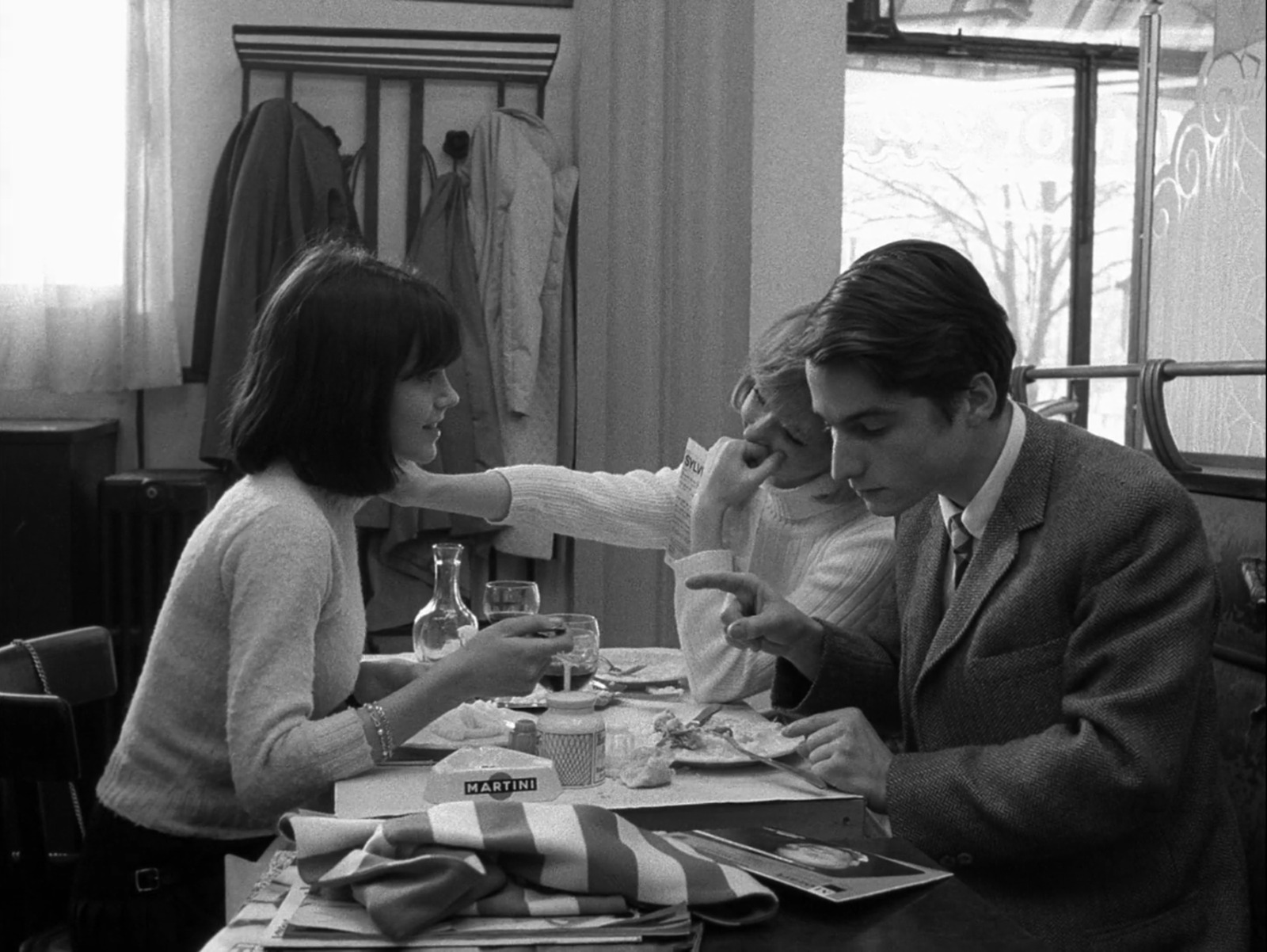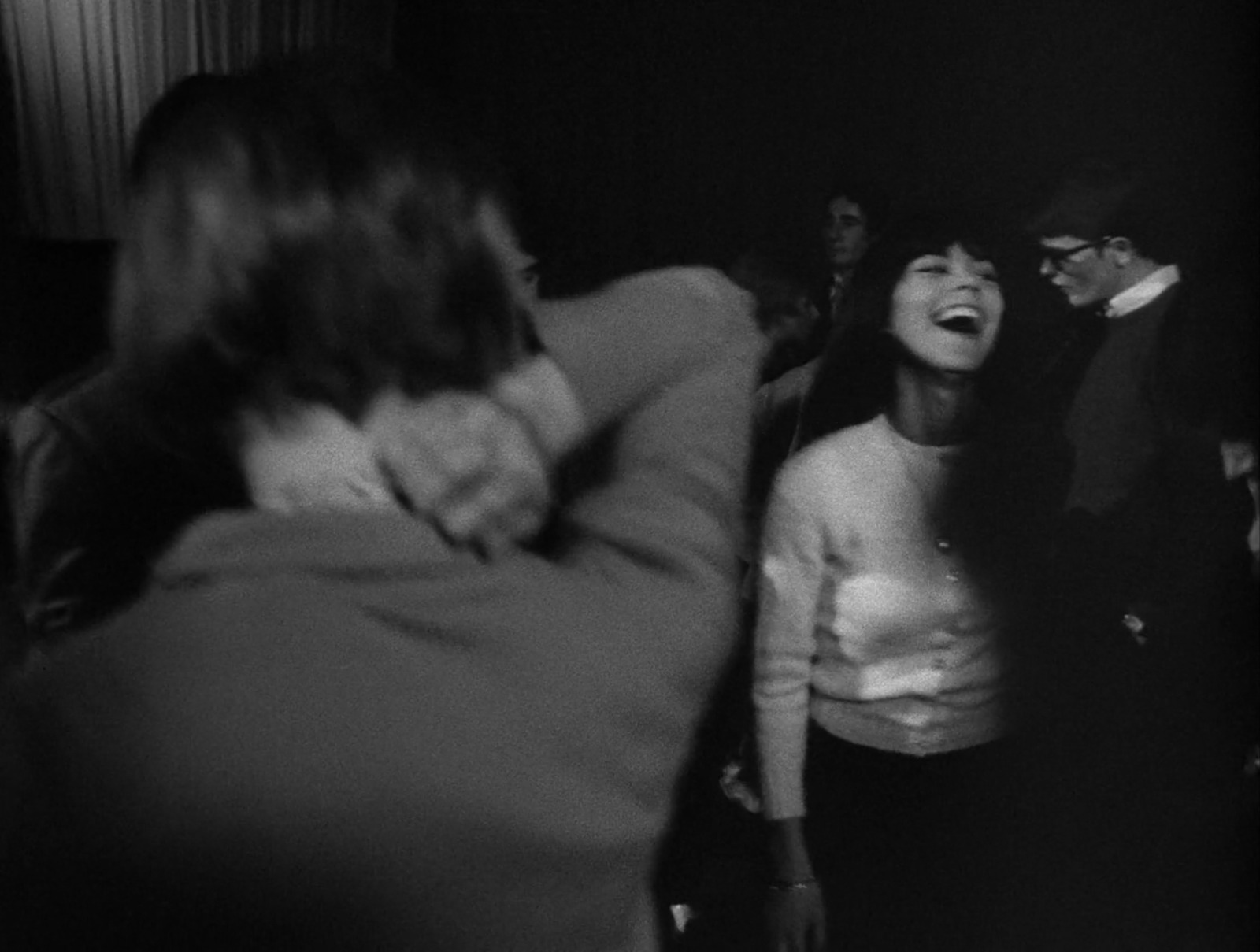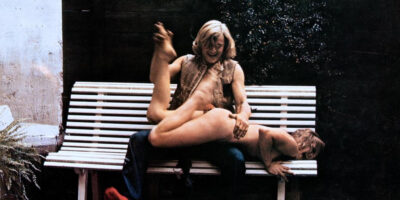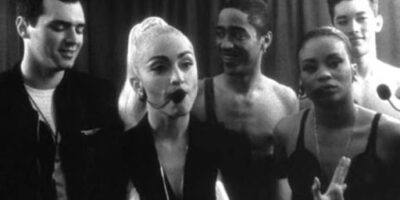In 1966, with an already well-established pension for subverting filmic language and conventions, Jean-Luc Godard conjoined his deep-seated antagonistic attitude towards traditional filmmaking with his want to make a film that captured the burgeoning youth culture in Paris more honestly than he had previously and with a more direct political presence. His answer? Working without a script. MASCULIN FÉMININ, a desaturated romp with the Parisian youth, doesn’t fight for your attention with the vulgar and jagged gestures of his previous work, but once you start to peel back the layers, you catch a big ol’ whiff of Godard at serious play. By this point in his career, Godard was familiar with integrating politics into his films, but with MASCULIN FÉMININ, he made more direct his unwavering disdain for the systems and institutions that propagated the type of filmmaking he thought pandered and condescended to audiences. With the making of this film, he wanted the means by which the film was made, designed, and edited, to fuel the averse narrative (e.g. no script); he wanted the film to be an honest reflection of youth culture and not a crude, studio-produced portrayal of a generation that didn’t exist.
Godard knew the best way to access authenticity was letting his young actors be co-creators. Before takes, Godard would ask the actors what they wanted to talk about, which they would then improv and talk through with one another as though there wasn’t a camera in the room. The actors, to a degree, weren’t really acting; they were socially posturing and exchanging intellectual jabs as they would under “normal” circumstances. The conversations range from the plight of the working class and the emptiness of platitudes to pop music and the distractions of the culture it nurtures. When Godard wanted to inject his musings and pose his own questions, he would have the actors wear earpieces so he could tell them what to prompt and how to respond. The results were scenes that play out like questionnaires, an aging iconoclast trying to understand the inner workings of a new generation by putting this new blood under the microscope. Godard wanted to constantly disrupt the viewing experience; he wanted to upend the audience’s expectations in an attempt to mock the sensational traditions of films previous.

Early in the film, in a scene that sets up how the rest will play out, Jean-Pierre Léaud’s Paul talks to Chantal Goya’s Madeleine about the Parisian working class, which he feels both “talks too much,” and hasn’t many “true activists,” but are also only in these positions because their lives are nothing more than “work, eating, sleep, work.” He’s fed up. Madeleine responds that she’s meeting a friend later, showing either disinterest or a general reluctance to hear beyond her own egotism. Then, Godard flicks the viewer right on the forehead. In the back of the café, a couple gets in a fight over what appears to be a lack of respect given to the femme partner, and after the man storms out with their child, the woman chases him out and shoots him in the back, killing him. Godard juxtaposes youthful apathy with an example of how the actual stresses of the world affect real people. But the scene ends there. The film cuts to a shot of some buildings, a busy city street, and finally the interior of a new café where a new conversation begins about a different topic. The viewer never sees any reactions to the violence. This is the first of many incongruities the film drops in without explanation, almost as if Godard recognized how much a modern audience would crave sensational, violent, and emotionally explicit drama to help them get through a film about the banality of life and the working class, but robs them of its conclusion. The edit forces the viewer to move on, indicative perhaps of a society Godard felt moved on from violence too easily or of a society that partially remained indifferent to an active occupation in Vietnam. The edit works two-fold in that both parties act as representations of social inaction: Paul, who waxes ideologies and injustices, his words just stand-ins for his lack of action, and people like Madeleine who are distracted and dulled by their own self interests.
Godard mines this combative filmmaking further in a later scene where Paul and Madeleine are trying to find a table in a café, but have to keep moving because Paul can’t make up his mind. Once he decides on a table and the two sit down, the camera dollies over to two old men reading erotica aloud. The camera dollies back over to the couple who are passive-aggressively avoiding communication, then back to the men. The frame of any film is technically the audience’s POV, but the camera here becomes Godard’s interpretation of the viewer’s attention; it begins to wander towards the erotic becuase that’s more sensational. Godard thinks his audience would rather listen to erotica than watch as Paul nervously tries, and fails, to communicate with someone he’s falling in love with. It’s hard to tell if Godard has contempt, is trying to be empathetic, or crudely holding up a mirror to the audience. Maybe this is compassionate filmmaking after all. Maybe Godard recognized these habits of apathy in the face of radically tumultuous times and wanted the audience to recognize them, too.

Godard wanted to capture the banality of life in 1965 in Paris for the youth caught somewhere in between layman Coca-Cola Americanisms and Marxist dogma calling for the destruction of the bourgeoisie. Godard genders this binarily, the women in the film falling primarily into the Coke category, with Madeline serving as their figurehead, and the boys, oh the shitty, Godardian, pretentious boys, into the Marx category, Paul the obvious poster child. His inclusion of this binary was a reaction to a trope that studio films had invented, showing this by revealing that regardless of what camp either of MASCULIN FÉMININ’s genders falls into, both lifestyles contain folks rotten and tolerable, neither the better to the other, and certainly not due to their politics. Paul, for all his romantic ideals and political truisms, is an intolerable creep, a picture-perfect representative of a man so caught in his ideological delusions that he justifies his misogynist actions with tepid political discourse. Despite Madeleine’s apathy towards the realities of others, she does contain a tenderness that one can’t help but hope turns into compassion. Godard knew the destruction that studios could inflict with their crude caricatures of the blossoming generation, so he reacted by letting his actors steer the vision themselves—a film of the youth, by the youth.
















Comments